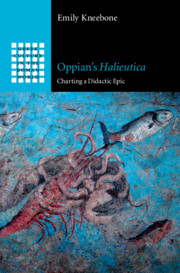Book contents
- Oppian’s Halieutica
- Greek Culture in the Roman World
- Oppian’s Halieutica
- Copyright page
- Epigraph
- Contents
- Acknowledgements
- Introduction: On Fishing
- Part I Didactic Poetry
- Chapter 1 Didactic Epic
- Chapter 2 Knowledge and Pleasure
- Chapter 3 Mapping the Sea
- Part II Morality at Sea
- Part III Humans and Animals
- Part IV The World Is a Sea
- Bibliography
- Subject Index
- Index Locorum
Chapter 2 - Knowledge and Pleasure
from Part I - Didactic Poetry
Published online by Cambridge University Press: 24 September 2020
- Oppian’s Halieutica
- Greek Culture in the Roman World
- Oppian’s Halieutica
- Copyright page
- Epigraph
- Contents
- Acknowledgements
- Introduction: On Fishing
- Part I Didactic Poetry
- Chapter 1 Didactic Epic
- Chapter 2 Knowledge and Pleasure
- Chapter 3 Mapping the Sea
- Part II Morality at Sea
- Part III Humans and Animals
- Part IV The World Is a Sea
- Bibliography
- Subject Index
- Index Locorum
Summary
The opening verses of the Halieutica are rich and rewarding. They establish the poet’s authoritative first-person voice, the subject-matter and scope of the work, and the identity and significance of its addressee. Oppian also draws attention to his markedly anthropomorphic representation of sea-creatures, and to the poem’s Homeric pedigree: as we will see in chapter 8, fish are figured programmatically in these lines as quasi-Iliadic warriors, and the poet engages in learned and allusive Homeric commentary. In didactic terms these lines both align and distinguish the work from the traditions of Homeric epic. The first verb of the poem, ἐξερέω, is emphatically delayed and set at the start of the third verse; it announces the poet’s aims and associates him with the poem’s addressee Marcus Aurelius. At key transitional moments in the Halieutica, including the proems to each book, Oppian again invokes the emperor, always in highly laudatory terms, and sometimes alongside his son Commodus.1 These addresses draw attention to the poet’s relationship with his imperial patrons, as Chapter 11 will explore, and at the same time impose a structure on the poet’s body of information, outlining the organising principles, content, aims, and imagined reception of the work. This explicit relationship with an addressee is an authorial stance that immediately differentiates such poetry from the narrative conventions of heroic epic.
- Type
- Chapter
- Information
- Oppian's HalieuticaCharting a Didactic Epic, pp. 44 - 82Publisher: Cambridge University PressPrint publication year: 2020

